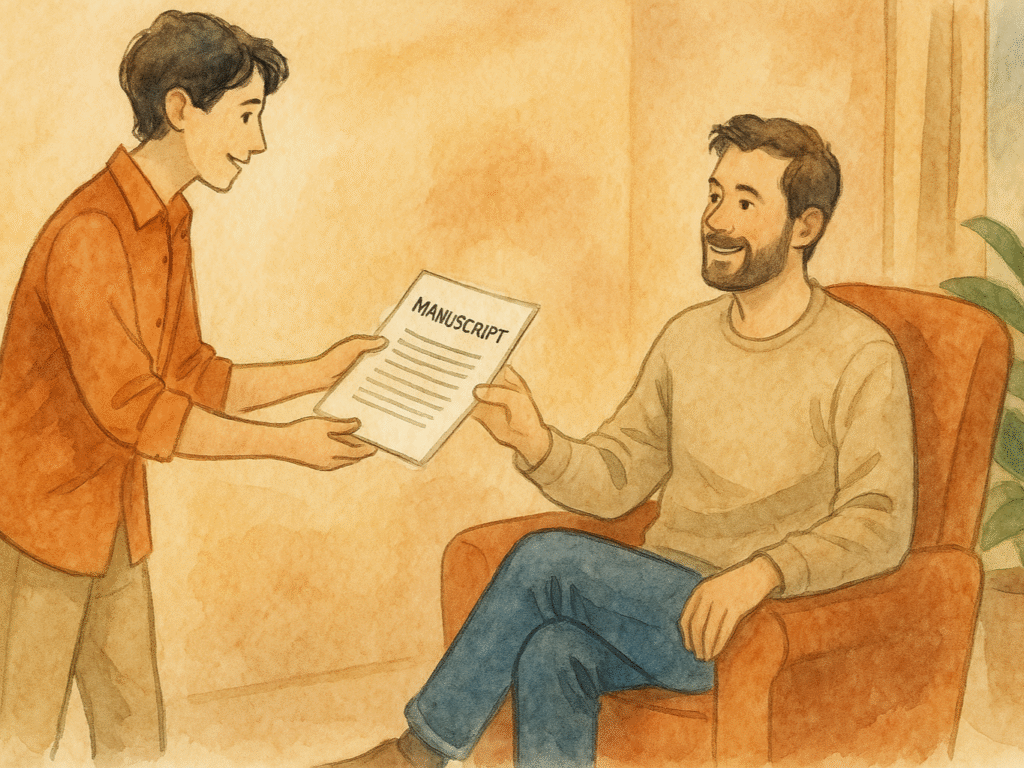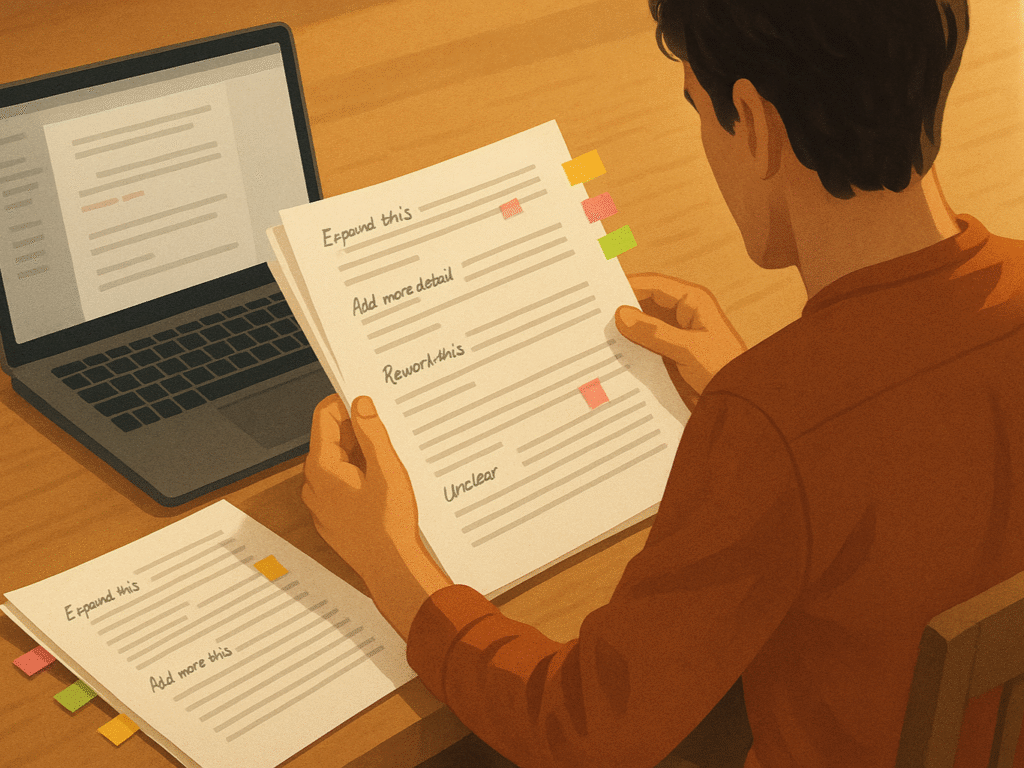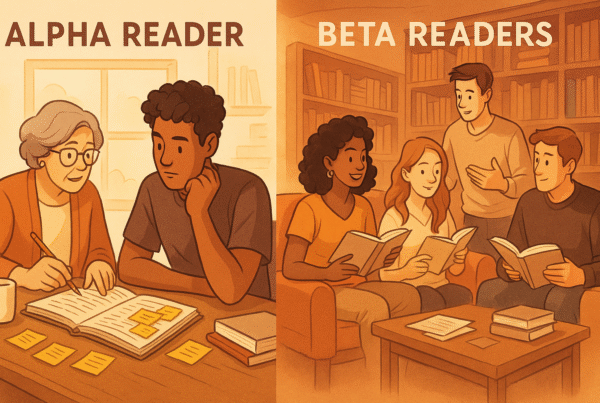Finishing your novel’s draft is an exciting milestone, but before sending it to agents or publishers, finding quality beta readers for novels can make all the difference in your work’s success. When writers share their manuscripts for feedback, the response is overwhelming. One popular writing platform has over 400+ comments from people seeking and offering critiques. A good beta reader can be incredibly valuable to your writing journey, potentially saving you significant time and money by helping improve your book before hiring an editor.
Beta readers are individuals who read your completed manuscript draft before submission to editors, agents, or a publication. Unlike editors or proofreaders who focus on grammar, beta readers approach your work from a reader’s perspective, providing honest feedback about whether your story keeps their interest and works effectively. Specifically, they act as a test audience, offering constructive criticism from the viewpoint of typical readers in your target audience.
When you’re wondering how to find beta readers for novels who understand your genre, you need trusted sources that consistently deliver reliable feedback. This guide will walk you through seven proven places to find beta readers who can help transform your manuscript into a polished work ready for the next steps in your publishing journey.
What is a beta reader, and why do you need one?

After spending countless hours crafting your novel, you’ve likely developed a form of “manuscript blindness”: an inability to see your work objectively. It is where beta readers come in. A beta reader is a test reader of an unreleased manuscript who provides feedback from the perspective of an average reader. The term “beta” comes from software development, where users test beta versions before final release.
Your ideal beta readers for novels should regularly read and enjoy books similar to yours, representing your target audience. Additionally, they’re typically individuals who approach your work as casual readers rather than professional editors. While they aren’t necessarily writing professionals, they offer invaluable insights into what your future readers will expect. However, some writers benefit from understanding the distinction between alpha and beta readers to determine which type of feedback they need first.
1. How beta readers help improve your novel
Beta readers for novels serve as your first real audience, offering feedback that can transform your manuscript in numerous ways. Furthermore, they help identify crucial issues that you might have overlooked due to your proximity to the work.
Beta readers contribute to your novel’s improvement by:
- Spotting plot holes and inconsistencies: They catch continuity errors, timeline issues, and logical gaps in your story
- Evaluating character development: They provide feedback on whether your characters feel realistic and consistent
- Assessing pacing and engagement: They tell you when sections drag or when they couldn’t put your book down
- Checking clarity and comprehension: They flag confusing passages or unclear explanations
- Identifying unintended reader reactions: They let you know if a serious scene accidentally comes across as funny
Many authors report that beta readers for novels are “a huge part of their process” since the longer they work on a manuscript, the more susceptible they become to blind spots. Moreover, if multiple beta readers point out the same issue in your text, it likely indicates something that other readers might question when the book is published.
Although you shouldn’t implement every suggestion, beta readers provide camaraderie on what can be a very solitary journey. Their encouragement and feedback create a supportive community around your writing process. Some of the most cherished scenes in published novels originated from authors fixing problems first identified by beta readers.
2. Beta readers vs editors vs critique partners
Understanding the roles of different feedback providers helps you maximize their value. Beta readers offer a reader’s perspective after revisions, focusing on story engagement, character connection, and pacing. They don’t rewrite your book; they react to it, simulating your eventual audience’s experience. For a deeper dive into the complete feedback ecosystem, this comprehensive guide explores how different types of readers contribute to your manuscript’s development.
Editors, by contrast, are hired professionals with specialized expertise in their respective genres. They dive deep into structure, character arcs, plot cohesion, and market expectations. While beta readers are essential, they can’t replace the rigorous developmental insight a skilled editor brings to refining a near-final manuscript.
Critique partners are fellow writers who provide detailed, craft-based feedback, often through manuscript swaps. They analyze story mechanics from a writer’s lens, offering actionable suggestions. Together, beta readers, editors, and critique partners form a feedback ecosystem that shapes your manuscript at different stages of development.
Alpha vs Beta Readers Explained: Which One Does Your Book Need First? Understanding the difference between feedback providers is crucial, but many writers don’t realize they might need alpha readers before beta readers. This comprehensive guide explains when to use each type of reader and how to sequence your feedback process for maximum manuscript improvement.
What do beta readers do exactly?

Beta readers serve as the bridge between your writing desk and your future audience. Think of them as early test readers who experience your manuscript through the lens of an average reader, providing valuable insights about how your story lands.
1. Big-picture feedback vs line edits
Beta readers primarily focus on big-picture feedback rather than detailed line editing. This distinction is crucial for both you and your beta readers to understand. A beta reader examines your manuscript from a reader’s perspective, not as if they were writing the book themselves. Their job isn’t to fix your grammar or rewrite your sentences: that’s what editors do.
The feedback spectrum from beta readers typically spans from simply offering a general opinion (such as “like” or “dislike”) to more detailed content evaluation. However, even when beta readers provide in-depth feedback, they should concentrate on story elements rather than sentence-level corrections.
Accurate beta reading is simply capturing a reader’s reaction. If sections felt tedious or confusing, they’ll tell you so without necessarily diagnosing why or how to address the issue. This raw, emotional response gives you insight into how future readers might experience your book.
Professional editors, in contrast, bring a trained eye to your manuscript. They can not only identify issues but also offer solutions while bringing expertise that amateur readers cannot provide. Remember that beta readers are volunteers offering opinions, whereas developmental editors are paid professionals providing solutions.
2. Common areas beta readers focus on
Beta readers typically evaluate several key aspects of your manuscript. Understanding these areas helps you prepare targeted questions and make the most of their feedback.
Beta readers commonly focus on:
- Plot and structure: Identifying plot holes, unresolved storylines, or pacing issues
- Character development: Assessing whether characters feel believable, consistent, and have clear motivations
- Emotional impact: Noting which scenes evoked strong reactions or fell flat emotionally
- Clarity and confusion: Flagging passages that were difficult to follow or understand
- Engagement levels: Pointing out where they lost interest or couldn’t stop reading
- World-building: Evaluating whether your setting feels immersive and consistent
First and foremost, beta readers should let you know whether they enjoyed the story and kept turning the pages. They’ll note where they got confused, bored, or excited. Unlike critique partners who might analyze your work from a writer’s perspective with attention to craft issues, beta readers approach your manuscript as readers.
Some beta readers may offer feedback that suggests specific changes. If their suggestions don’t align with your vision, try to understand the problem they’re attempting to solve. The underlying issue they’ve identified might be valid even if their proposed solution doesn’t fit your story.
Beta reading should occur after you’ve completed all the revising you can do on your own. Your manuscript doesn’t need to be perfectly polished, yet you should clean up spelling and grammar enough that readers aren’t distracted by constant errors. Don’t expect beta readers to serve as proofreaders or line editors: their primary job is to communicate how well your story works.
Notice if multiple beta readers mention the same issues, this pattern recognition is incredibly valuable. When several readers struggle with the same character or scene, it strongly suggests something needs adjustment. Patterns in feedback often reveal your manuscript’s true strengths and weaknesses better than any single opinion could.
7 trusted sources to find beta readers for novels

Now that you understand what beta readers do, let’s explore where to find them. Discovering the right beta readers for novels requires knowing which platforms connect writers with readers. Each source offers unique advantages depending on your specific needs and genre.
1. Christian Writers
ChristianWriters.com is a faith-based writing community offering forums for manuscript critiques, job postings, and connection threads. It blends writing craft with spiritual fellowship, making it ideal for authors seeking both peer feedback and faith-driven encouragement.
(i) How the Beta Reading Process Works
Authors post requests in the “Beta Readers” or Jobs & Project Connections forums. Interested readers are invited to respond via the thread or private message.
- Draft posting or sample chapters shared
- Reader volunteers offer to beta-read.
- You and the reader agree on the timeline and feedback format.
- The reader provides comments (e.g., plot clarity, engagement)
- You thank them and follow up.
(ii) Pricing Model (Free, Freemium, or Paid?)
ChristianWriters.com is entirely free to join and use.
- No paid membership needed
- No hidden fees for critique posts
- All beta reader requests and responses are volunteer-based
(iii) Highlights
- Free access to critique and connection forums
- No pay-to-post or membership tiers
- No premium features or paid matching
(iv) Best Use Cases / Who It’s For
Ideal for Christian fiction and nonfiction authors seeking honest reader feedback within a faith context.
- Write spiritually themed novels
- Want genre-aligned beta readers.
- Appreciate feedback rooted in shared faith values.
- Seek a non-paying volunteer network.
- Want ongoing critique partnerships.
(v) Feedback Quality & Community Engagement
The community is active and supportive, with many long-standing members offering multi-chapter feedback (e.g., “The Battle For Faith”). Responses are typically thoughtful and aligned with Christian themes. Engagement varies; some threads gain traction quickly, while others may need nudging.
(vi) Pros
- Strong faith-based peer support
- Fully free and volunteer-driven
- Genre-specific feedback on Christian themes
- Active job & beta reader request forums
(vii) Cons
- May experience slower response times
- Quality may vary depending on volunteer commitment
- Lacks automated matching or structured review tools
2. Critique Circle
Critique Circle is a veteran online writing workshop (active since 2003) that operates on a credit-for-feedback model. Writers critique peers’ work to earn credits, which they spend to have their own stories critiqued. It balances reciprocal feedback with community engagement.
(i) How the Beta Reading Process Works
After registering, members critique others’ stories to earn credits. Once credits are accumulated, they submit their work for review.
- Earn ½ to 2 credits per critique, depending on length.
- Spend three credits per story submission.
- Stories stay in public queues for weekly review cycles.
- Feedback is posted within one week.
- Authors revise their work based on critiques and may resubmit it for further review.
(ii) Pricing Model (Free, Freemium, or Paid?)
Critique Circle offers a solid free tier:
- Free membership, credit-based submission system
- Earn by providing critiques, no cash needed
- Premium ($11/month) & Gold ($18/month) add perks like private queues, editing drafts while live, and no ads
(iii) Highlights
- Free core access, premium features optional
- Premium streamlines workflows and boosts control
- Credits prevent free-for-all spam.
(iv) Best Use Cases / Who It’s For
Ideal for authors who want structured peer feedback across genres, enjoy reciprocal critique, and value community-driven review. Perfect for novelists polishing early drafts before professional editing.
- Need regular critique cycles.
- Want multiple reader viewpoints.
- Prefer genre diversity
- Enjoy gamified feedback
- Seek feedback on consistency.
(v) Feedback Quality & Community Engagement
Critique Circle boasts a robust, active membership that prioritizes constructive criticism. Members typically receive multiple detailed critiques per submission, often within a week. The quality varies, but community moderation and peer ratings help surface helpful feedback.
(vi) Pros
- Encourages genuine reciprocity, critique to get critique
- Free to use with optional upgrades
- Diverse, active community with weekly review cycles
- Premium perks like private queues and editing flexibility
(vii) Cons
- Quality may vary depending on reviewers
- Earning credits may feel like extra work.
- A premium subscription may be required for access to advanced features.
In summary, Critique Circle offers a well-balanced platform that rewards mutual participation and supports authors in refining novels through community critique. Please let me know if you’d like guidance on setting up your first queue or optimizing your feedback management.
3. Fantasy-Writers.org
Fantasy-Writers.org is a free online community focused on fantasy fiction. It features active forums, monthly writing challenges, and story-sharing sections, allowing writers to post chapters and receive feedback from peers, including volunteers and published authors.
(i) How the Beta Reading Process Works
Writers share chapters or drafts in the “Beta-Readers” or “Stories” forum sections. Interested readers are encouraged to respond in-thread or via private message.
- Post the first chapters (typically weekly)
- Readers comment and offer full-read feedback.
- Authors select trusted responders.
- Readers provide a detailed critique.
- Repeat for subsequent chapters or complete drafts.
(ii) Pricing Model (Free, Freemium, or Paid?)
Fantasy-Writers.org is entirely free:
- No membership fees
- No premium tiers or credit systems
- Focus on volunteer-based feedback
- No paid features
(iii) Highlights
- Free to join and post
- No paywall for beta reader requests
- Pure community-driven resource
(iv) Best Use Cases / Who It’s For
Perfect for fantasy authors wanting a genre-specific, peer-based critique environment.
- Are you drafting fantasy novels
- Want chapter-by-chapter feedback
- Prefer feedback from genre enthusiasts.
- Are you comfortable with a volunteer critique?
- Enjoy participating in writing challenges.
(v) Feedback Quality & Community Engagement
The site boasts a longstanding, engaged user base. Feedback is thoughtful, focused on narrative issues, world-building, and reader impact. Participation varies, but most story posts receive comments, and monthly challenges help maintain activity.
(vi) Pros
- Strong fantasy-focused community
- Completely free and easy to access
- Writers and readers actively share feedback.
- Regular challenges foster consistent engagement.
(vii) Cons
- Community activity may fluctuate
- Feedback depth depends on volunteer commitment.
- No structured review tools or credit system
Fantasy-Writers.org is a top-tier choice for fantasy authors who want genuine, community-driven beta reading without cost. Let me know if you’d like help posting a successful beta request or engaging with the community!
4. KidLit 411
Kidlit411 is a centralized resource hub for writers and illustrators of children’s literature, encompassing picture books, chapter books, and middle-grade and YA titles. It offers links to industry resources, critique groups, beta reader connections, writing contests, and publishing opportunities, all tailored for the kidlit niche.
(i) How the Beta Reading Process Works (User Flow)
Kidlit411 does not host its beta platform; instead, it connects writers to beta readers through curated Facebook groups and community boards.
- Join the Kidlit411 Manuscript Swap Facebook group.
- Post a request with manuscript type, age category, and word count.
- Find a match from commenters or browse existing requests.
- Exchange manuscripts via email or Google Docs.
- Provide feedback and build long-term critique partnerships.
(ii) Pricing Model (Free, Freemium, or Paid?)
Kidlit411 is entirely free and ad-supported. It does not require membership fees and does not have a premium version.
- Free access to all site content
- Free Facebook group participation
- No upsells or paid features
- No submission fees
- No dedicated user dashboard or feedback platform
(iii) Best Use Cases / Who It’s For
Kidlit411 is perfect for children’s book authors seeking craft resources, agent listings, and beta readers in their niche.
- Picture book and middle grade writers
- First-time kidlit authors
- Writers looking for beta swaps
- Authors needing industry tools (agents, contests, critique lists)
- Illustrators seeking writer collaboration
(iv) Feedback Quality & Community Engagement
The Kidlit411 Manuscript Swap Facebook group is an active and moderated community, featuring a high volume of daily posts from writers across all kidlit categories. Since swaps are peer-based, the quality of feedback depends on effective communication and mutual effort; however, the niche focus ensures that feedback is genre-appropriate.
(v) Pros
- Completely free and community-driven
- Niche-specific for children’s book creators
- Active manuscript swap group
- Great supplementary writing resources (agent lists, contests)
(vi) Cons
- No internal platform for submissions or editing
- Feedback quality varies with each swap partner.
- Requires Facebook to access the critique group
If you’d like, I can help you draft a perfect post for the Kidlit411 Manuscript Swap group to find beta readers fast. Please let me know the type of book, age range, and the kind of feedback you’re looking for.
5. LitReactor
LitReactor is an established writing community owned by Reedsy, offering articles, active forums, and peer-review systems. While not a dedicated beta reader site, its community-driven environment supports constructive feedback and writer networking.
(i) How the Beta Reading Process Works
Though LitReactor lacks formal beta pairing, writers can engage via forums and the community.
- Post story excerpts in writing or feedback forums
- Invite peers to comment or “beta”
- Discuss reader observations in replies.
- Implement feedback received
- Repost revised chapters for further review.
(ii) Pricing Model (Free, Freemium, or Paid?)
LitReactor offers a freemium structure:
- Free access to articles, forums, and community interaction
- No cost option for peer feedback
- Paid classes and workshops available via Reedsy
- Marketplace tools may require a subscription for full access
(iii) Best Use Cases / Who It’s For
Perfect for writers who value in-depth craft discussions and occasional peer review.
- Speculative fiction authors
- Writers seeking craft advice alongside feedback
- Authors want flexible, topic-driven exchanges.
- Community-oriented writers
- Those who may invest in paid writing courses
(iv) Feedback Quality & Community Engagement
LitReactor provides high-quality feedback through an engaged and knowledgeable community of writers and critics. Community columns and discussions (e.g., “Five Be’s to Being a Better Beta Buddy”) reflect a mature, thoughtful peer culture. However, feedback tends to be occasional, rather than structured, like dedicated beta programs.
(v) Pros
- Strong writing community with craft-focused content
- Free peer interaction and feedback
- Mature audience that values quality critique
- Integrated with Reedsy’s paid learning resources
(vi) Cons
- May lack consistent beta reader matching
- Peer feedback might come slowly or irregularly.
- Quality varies; it’s not a structured critique system.
LitReactor is ideal for authors seeking literary insight and occasional peer feedback in a professional, craft-centered community. However, for dedicated beta reading, pairing it with a specialized platform may provide the structured review process some novels need.
6. Scribophile
Scribophile is a well-established, award-winning online writing workshop and community where writers exchange detailed critiques using a points-based system. It emphasizes quality feedback, peer learning, and accountability, making it a hub for serious novelists seeking insightful beta reader interaction.
(i) How the Beta Reading Process Works
Scribophile operates on a reciprocal feedback model:
- Critique others to earn karma points
- Spend points to post your chapters.
- Join genre-specific groups and spotlight threads.
- Beta-reader directory matches based on interest
- Receive inline feedback and organized critique summaries.
(ii) Pricing Model (Free, Freemium, or Paid?)
Scribophile uses a freemium structure:
- Free basic plan includes critique and posting limits
- The karma system ensures balanced participation
- Premium membership (~$15/month) adds unlimited posts, beta-reader directory access, private messages, and ad removal
(iii) Pricing Summary
- Free with limitations
- Premium enhances experience and access.
- Encourages mutual critique over direct payments
(iv) Best Use Cases / Who It’s For
Great for beta readers for novels seeking structured, constructive feedback through community participation.
- Want regular, detailed critiques
- Value peer accountability
- Enjoy gamified feedback systems.
- Appreciate genre-focused groups
- Seek both beta readers and craft discussion.
(v) Feedback Quality & Community Engagement
Scribophile boasts a large, dedicated user base passionate about craft. Feedback is often in-depth, sometimes lasting an hour, and includes inline comments and comprehensive critique summaries. The active forums and writing sprints foster accountability and camaraderie, though response times vary by group activity.
(vi) Pros
- The Karma system fosters fairness and high-quality critique.
- Rich inline tools enhance feedback precision.
- Active forums and structured groups boost engagement.
- Peer learning improves both writing and critiquing skills.
(vii) Cons
- May require a time investment to build karma
- Free tier limits might frustrate eager writers.
- Premium needed for advanced tools and full directory access
In summary, Scribophile provides a robust platform for writers seeking meaningful beta reader feedback within an engaged, craft-focused community. Let me know if you’d like help setting up your first post or navigating their beta-reader directory!
7. 10 Minute Novelists (Facebook Group)
This Facebook group connects time‑pressured writers with beta readers: a community space where authors post requests and readers volunteer. It serves as a quick matchmaking hub, ideal for soliciting beta feedback without requiring the posting of full manuscripts.
(i) How the Beta Reading Process Works
The authors post a call for readers with book details.
- Join group
- Post synopsis, genre, word count
- Interested beta readers, comment or DM.
- Author selects reader(s)
- Exchange the manuscript via a private channel.
- The reader returns feedback as agreed.
(ii) Pricing Model (Free, Freemium, or Paid?)
Completely free, no fees or membership tiers.
- Free to join and post
- Volunteer beta readers
- No paywalls or subscription-based limits
- No formal matching or tracking features; interaction is ad hoc
(iii) Best Use Cases / Who It’s For
Ideal for authors needing immediate beta reader help for short manuscripts or specific scenes.
- Have tight timelines
- Want fast volunteer feedback.
- Write novels or short fiction.
- Prefer genre‑matched readers
- Want to build casual critique networks.
(iv) Feedback Quality & Community Engagement
The group features active participation, and readers often volunteer within hours. Feedback varies based on commitment and the clarity of communication. Posts with clear instructions and expectations (word count, deadline) receive better responses. Response quality ranges from brief thoughts to deeper reader impressions.
(v) Pros
- Fast responses from available volunteers
- Specific targeting by genre and timeline
- Completely free and easy to access
- Informal, flexible interaction
(vi) Cons
- Volunteer feedback quality may vary
- No structure for reader matching or tracking
- May require many posts/retries to find committed readers
This Facebook group is a convenient, no-cost way to connect with willing beta readers quickly, provided you communicate clearly and manage expectations effectively. Let me know if you’d like help drafting an attention-grabbing group post!
How to choose the right beta reader
Selecting the perfect beta readers for novels requires careful consideration beyond simply finding willing volunteers. The quality of feedback you receive depends largely on who you choose and how well they match your manuscript’s needs. Finding numerous beta readers is only half the battle; identifying the right ones makes all the difference in receiving invaluable insights.
1. Genre familiarity and reading habits
First, remember that ideal beta readers for novels should be avid readers in your specific genre. These individuals innately understand genre tropes and conventions, allowing them to provide more relevant feedback. Someone who regularly reads fantasy will better recognize when your worldbuilding falters, just as a romance reader will immediately notice if your relationship development seems forced.
Consider these questions when evaluating a potential beta reader’s genre familiarity:
- Do they read regularly in your book’s genre?
- Are they familiar with recent publications similar to your work?
- Can they identify familiar genre tropes and expectations?
A beta reader who doesn’t typically enjoy your genre might struggle to provide targeted feedback. As one experienced author notes, “If you’re writing romance, a reader who doesn’t read romance probably won’t understand the tropes or give you the most insight with your target audience”. Indeed, someone unfamiliar with your genre might focus on aspects that genre fans would readily accept or suggest changes that undermine genre conventions.
Nevertheless, including one beta reader from outside your genre can occasionally provide fresh perspectives. They might catch assumptions you’ve made that dedicated genre readers take for granted.
2. Reliability and communication style
Equally important is finding beta readers who demonstrate reliability and effective communication. Considering beta reading is time-consuming and typically unpaid, you need individuals who honor their commitments. Indeed, nothing is more frustrating than waiting weeks for feedback that never arrives.
When assessing reliability, look for beta readers who:
- Respond promptly to messages
- Have experience completing similar commitments
- They are clear about their availability and timeline
Communication style matters tremendously. Some beta readers provide gentle, encouraging feedback, whereas others offer brutally honest critiques. Neither approach is inherently superior; what matters is which style helps you improve your work. Be upfront about what type of feedback serves you best.
Setting clear expectations and deadlines creates accountability on both sides. “Just as with the deadline, you don’t want to tell the reader to ‘let me know what you think.’ It is especially true of a reader who is new to you. Set everyone up for success with a list of questions”. Providing a reasonable timeframe respects both your schedule and theirs.
3. Experience with beta reading
A beta reader’s experience level significantly impacts the quality of their feedback for beta readers of novels. Seasoned readers typically provide more balanced and actionable insights with minimal direction. They can highlight narrative issues, pacing problems, or character inconsistencies more precisely than casual readers without overwhelming you with vague reactions or line edits.
- Mix experience levels to gain a well-rounded view, including pros, casual readers, and “wild cards.”
- Select readers with topic-specific knowledge to enhance the realism and accuracy of the content.
- Avoid critique partners who are already familiar with your manuscript, as they may lose objectivity.
Ultimately, the best beta readers combine honesty, focus, and strong communication. They not only catch weak spots but also recognize your story’s strengths. Though it may take trial and error to find them, great beta readers elevate your work in ways even paid professionals sometimes can’t.
How many beta readers should I have? Finding the right beta readers is essential, but knowing how many you need prevents feedback overload while ensuring comprehensive coverage. This detailed analysis reveals the optimal number of beta readers based on your genre, manuscript length, and publishing goals.
Should you pay for beta readers?

The question of whether to pay for beta readers for novels often divides the writing community.fz Some authors swear by free volunteers, whereas others find value in hiring professional readers. Understanding both approaches helps you make an informed decision for your manuscript.
1. Free vs paid beta readers
Traditional beta reading has typically been a volunteer activity based on reciprocity and community support. Free beta readers often participate because they enjoy reading unpublished works and supporting authors. Many writers report success in finding volunteer readers through writing groups and online communities.
Free beta readers offer several advantages. First, you can recruit multiple readers without budget constraints. Additionally, volunteer readers are often genuinely passionate about your genre and provide feedback because they’re invested in your story’s success. Furthermore, free beta reading enables you to build meaningful connections within your writing community that might evolve into long-term critique partnerships.
On the other hand, volunteer beta readers sometimes disappear mid-read or fail to provide promised feedback. Plus, without financial commitment, timeframes can stretch indefinitely. Authors frequently report being “ghosted” by free beta readers who initially expressed enthusiasm but never completed the manuscript.
Paid beta readers, in contrast, operate under professional agreements with clear expectations. They’re more likely to meet deadlines and provide comprehensive feedback since it’s a business transaction. Many professional beta readers have training in story craft or editing, potentially offering more structured insights than casual readers.
2. When hiring a beta reader makes sense.
Consider paying for beta readers under these circumstances:
- You’ve struggled to find reliable volunteers who follow through
- You need feedback within a specific timeframe
- You want readers with professional experience or training
- You’ve received vague or unhelpful feedback from free beta readers
- You lack a writing network to draw from for reciprocal exchanges
Many authors find that paid beta reading yields higher-quality responses and provides answers to specific questions about their manuscript. If you’re working toward publication deadlines or value certainty in your revision process, the investment might be worthwhile.
Ultimately, paid beta readers should never be considered a requirement for publishing success. Instead, view them as one potential tool in your writing toolkit, especially valuable if you lack access to a robust writing community.
7 Best Places To Find Beta Readers For Hire (Professional Services Compared): Ready to invest in professional beta reading services? This detailed comparison evaluates pricing, turnaround times, and service quality across the top platforms for hiring beta readers, helping you choose the best fit for your budget and timeline.
3. Where to find beta readers for hire
If you decide to hire beta readers, several platforms connect authors with professional readers. Fiverr hosts numerous beta readers offering services ranging from $25 to $300, with pricing typically based on manuscript length. Upwork similarly features freelancers offering beta reading services. For a comprehensive comparison of professional services, this detailed analysis of beta readers for hire evaluates pricing, quality, and turnaround times across major platforms.
Beyond general freelance marketplaces, specialized services focus exclusively on manuscript feedback. Better Beta Readers charges a flat fee of USD 325 for manuscripts up to 100,000 words. Other professional beta readers charge around USD 0.001 per word (approximately USD 100 for a 100,000-word novel).
Be cautious about who you hire in the future. Some listings on freelance sites offer editing or proofreading services rather than accurate beta reading. Remember that beta reading should focus on reader reactions rather than technical editing. Before hiring, clarify what feedback you’ll receive, timeframes, and whether the reader has experience with your specific genre.
Before investing, ask potential beta readers about their background, request testimonials from previous clients, and inquire about their reading preferences. The best-paid beta readers will have a structured process for providing feedback and clear terms regarding what you can expect from their service.
Free beta readers: While paid beta readers offer certain advantages, free beta readers can provide equally valuable feedback when you know where to find them. This comprehensive guide reveals the best free platforms and strategies for attracting committed volunteer readers.
How to work with beta readers effectively
Once you’ve assembled your team of beta readers for novels, the next challenge is managing the process effectively. The relationship between author and beta reader requires clear communication and mutual respect to yield the best results.
1. Setting expectations and deadlines
To begin with, establish clear expectations before sending your manuscript to beta readers. Explain the current state of your manuscript, whether it’s a rough draft or a polished version. When sharing your work, specifically mention what type of feedback you’re seeking. For instance, you might inform beta readers that you’re only interested in content, structure, and overall tone, rather than line-by-line editing.
Many authors find success by asking about specific elements they’re concerned about upfront. Yet, be careful not to overwhelm your readers with too many questions, as this may negatively impact their reading experience. One experienced author recommends: “Step back and let them form their own opinions.”
Setting a reasonable deadline is crucial, even if you aren’t working on a strict timeline. Most beta rounds typically last one to two weeks for sections of five chapters, or two weeks for longer segments of about ten chapters. When establishing deadlines, consider:
- The length of your manuscript
- The type of feedback requested
- Your beta readers’ schedules
The optimal number and timeline depend on several factors, which this guide on beta reader quantity explores in detail.
2. Providing a feedback guide
As part of the preparation, create a feedback guide or questionnaire for your beta readers. This structured approach helps them provide more valuable insights than a simple “I liked it” or “It wasn’t for me.” A thoughtful questionnaire directs their attention to specific aspects of your story.
Avoid yes/no questions when possible. Instead, craft questions that encourage detailed responses about the reader’s experience, such as:
- What engaged or excited you at the beginning of the story?
- Were there any parts that felt too slow or too fast?
- How would you describe this book to friends?
- Did any characters feel inconsistent or underdeveloped?
“By directing your beta readers’ attention to specific issues and asking them to answer carefully-constructed questions about their experience with your book, you will likely elicit the kind of constructive, meaningful feedback that will help you take your manuscript to the next level.”
3. Respecting their time and effort
Above all, remember that your beta readers are giving you the gift of many hours of their time. For professional editors, you’d be paying thousands of dollars for similar services. Please show respect for this gift by not pestering them with frequent progress updates after you’ve set deadlines.
If a beta reader misses the agreed deadline, send a gentle follow-up email asking about their progress. Should they be unable to complete the read, graciously thank them for their interest and look elsewhere for another beta reader.
After receiving feedback, express your gratitude in a meaningful way. Beyond verbal thanks, consider:
- Including beta readers in your book’s acknowledgments (with their permission)
- Sending a signed copy of your published book
- Offering to beta-read their work in return
The most successful author-beta reader relationships are built on mutual respect and trust. As one writing coach puts it: “If you’re asking someone to take time to critique your work, be willing to give their work the same amount of devotion.”
What to do with the feedback you receive

Receiving feedback from beta readers marks a pivotal turning point in the novel development process. After all your preparation, you now face a stack of comments that might range from encouraging to disheartening. Taking a deep breath before diving in helps tremendously.
Why Most Writers Get Beta Readers Wrong: Even with great beta readers, many writers sabotage their feedback process through common mistakes. This eye-opening guide reveals the critical errors that prevent writers from maximizing the value of their beta reading investment.
1. Looking for patterns in feedback
One of the most valuable signals in beta reader feedback is the repetition of comments across different readers. When multiple beta readers flag the same issue, it strongly indicates something worth investigating. These patterns reveal problems that average readers will likely notice in your published work. Understanding the optimal number of beta readers helps ensure you have enough feedback to identify meaningful patterns without getting overwhelmed by conflicting opinions.
First, organize feedback by separating scene-specific notes from overall impressions about pacing, characterization, and other broader elements. This organization makes pattern recognition much simpler and helps prioritize your revision efforts.
Beyond what readers criticize, pay attention to what they collectively praise. Understanding your strengths is equally essential as identifying weaknesses.
2. Balancing conflicting opinions
Beta readers inevitably provide contradictory feedback; what one person loves, another might hate. It can be bewildering at first glance.
To navigate these contradictions, consider each beta reader’s background and reading preferences. Are they familiar with your genre? Their feedback should be weighed accordingly.
When confronted with conflicting opinions, examine what problem the beta reader is trying to solve rather than focusing solely on their suggested solution. Often, even conflicting advice points to a genuine issue that needs addressing, just in a different way than proposed.
3. Deciding what to revise
After careful consideration, most writers agree with approximately 95% of beta reader feedback, recognizing immediately that changes would improve their manuscript. For the remaining suggestions, trust your instincts about what best serves your story.
Take the time to process critical feedback before making a decision. Many authors initially disagree with feedback, only to recognize its value after reflection. The best approach involves setting feedback aside temporarily, allowing it to percolate in your mind before making decisions.
Remember, you’re making these revisions to strengthen your story, not merely to appease readers. The ultimate goal isn’t making your story “good enough” but making it great.
Final Thoughts
Finding quality beta readers for novels marks a crucial step in your novel’s journey from draft to publication. Beta readers serve as your first real audience, offering honest reactions that friends and family might avoid. Their input helps you polish plot holes, refine pacing, and resolve character inconsistencies before editors ever see your work.
Unlike editors or critique partners, beta readers offer the reader’s perspective, reacting as your target audience would. It makes them invaluable in judging emotional impact, engagement, and clarity. Whether you connect through online forums, writing groups, or niche platforms, always look for genre-matched readers who are committed to thoughtful and timely feedback.
Strong beta reader relationships require clear expectations, respectful communication, and gratitude. Structure feedback with questions, respect deadlines, and focus on repeated critiques rather than outliers. In the end, beta readers help bridge the gap between your manuscript and its readers, turning raw drafts into compelling novels with real commercial potential.
FAQs
Q1. What is a beta reader, and why do you need one?
Beta readers for novels are early test readers who provide honest, reader-level feedback. They help authors refine character development, pacing, and plot structure before professional editing begins, offering insights that align more closely with those of general readers.
Q2. How do beta readers help improve your novel?
Beta readers for novels evaluate emotional impact, character believability, plot clarity, and engagement. Their feedback reveals issues that writers often overlook, such as confusing scenes, dull pacing, or inconsistent character arcs, so you can make revisions that resonate better with your intended audience.
Q3. What are the differences between beta readers, editors, and critique partners?
Beta readers for novels offer reader-first impressions. Editors focus on structure, grammar, and market readiness. Critique partners provide technical, writer-to-writer craft feedback. Each role plays a different part in refining your manuscript through various development phases.
Q4. Where can you find reliable beta readers for your novel?
To connect with beta readers for novels, explore genre-specific Facebook groups, Reddit threads, writing forums, and dedicated websites like Scribophile or Critique Circle. Joining writing communities also increases your chances of meeting committed, genre-appropriate beta readers.


